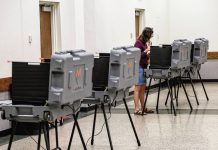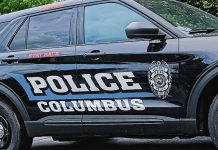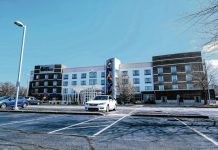A visit to the dentist started the Rev. Scott Murphy, senior pastor at Memorial Baptist Church in Columbus, on an unexpected journey.
In 2011 while living in Guthrie, Kentucky, Murphy felt something on his jaw, so at a dentist visit he asked about it.
An X-ray revealed a black mass. The dentist didn’t know what it was and sent Murphy to his family doctor, who in turn referred him to an oral surgeon.
The surgeon thought it might be a cyst but suggested Murphy see a cancer specialist. The cancer doctor wasn’t sure what it was, either. Finally, a friend suggested he find a top doctor at Vanderbilt University in Nashville, Tennessee, about 50 miles away.
[sc:text-divider text-divider-title=”Story continues below gallery” ]
Murphy found Dr. Greg Richardson, the former chief of oral cancer surgery at Vanderbilt. The doctor scraped away everything along Scott’s jaw and sent it to pathology. When Murphy and his wife, Kristie, went to hear the diagnosis, they learned that he had ameloblastoma, an aggressive form of cancer that usually forms in the jaw.
It has nothing to do with smoking or tobacco use and is rare; Murphy said his doctor had seen only four cases previously.
Murphy had two options: Do nothing and let the cancer grow or cut out the diseased part of the jaw — including the gum, nerves and seven teeth — and then rebuild it with titanium plates and a bone graft from his hip. At first, he thought doing nothing seemed better; but after crying with his wife on the way home, they chose the second option.
A week after his diagnosis, Murphy traveled to Tulsa, Oklahoma, for one of his last classes for a master’s degree: Introduction to Clinical Pastoral Education. He was required to visit terminal cancer patients, which Murphy said he found traumatic. One night alone in his hotel room, he started crying, thinking his “world was about to end.” He called Richardson, knowing it was late and that he would just get the answering service. However, the doctor called him back 10 minutes later and spent an hour-and-a-half on the phone with Murphy, walking him through the upcoming surgery and praying with him.
Murphy said he is grateful for Richardson and recommends that patients look for a doctor with whom they can have a good relationship. Murphy said he also learned that looking at Internet videos of cancer patients and repeatedly listening to Randy Pausch’s “The Last Lecture” — about a college professor with terminal pancreatic cancer giving a final talk to his students — was not very helpful.
Murphy spent a week in the hospital after his surgery and found the feeling of aloneness there humbling. Kristie Murphy was there when she could be, but she had to juggle her work as a school teacher, taking care of their three young children and being with Scott in the hospital 50 miles away.
Kristie did get some help when her mother stayed with them for a week after Scott came home. Kristie said she learned that she and Scott could go through the ordeal together and that it would be OK. She said she thinks it was good for Scott “to realize that during that time she was there for him and their children” even though he wanted more of her attention.
Scott Murphy said the first time he looked at himself in the mirror after his surgery was traumatic because his face was caved in and had no teeth or gums. Talking was embarrassing, he said.
Murphy worked with a speech pathologist for several months. He has a partial denture to replace his missing teeth, but he plans to get dental implants once he and Kristie can save enough money. Their insurance, which they said is good, covered the surgery. However, it doesn’t cover implants. Murphy said he is still very conscious of his teeth, and his children think “he’s like a monster” when he removes his partial.
Murphy also had to relearn to walk because bone for his jaw was removed from his hip. He described his physical therapy as “hell” and “painful.” His wife helped with his care at home, including walking him to the mailbox regularly. He used a walker for about two months until he was back to normal.
Murphy returned to Nashville every three months for an MRI, even after the family moved to Manhattan, Kansas. The scans continued until he passed the three-year reoccurrence date.
When it comes time to do the implants, Murphy said, he plans to return to Nashville because Richardson is familiar with his new jaw.
Faith and support from the Guthrie community helped him get through the challenge, he said. Cards and prayers from all the local churches were a touching surprise, he said. Kristie’s colleagues also called to offer support.
The journey transformed his faith, he said, because he’s become more open minded and recognizes that he doesn’t know everything. Murphy said he has learned that he is not in control; a higher power is. He added that he is is less judgmental now and can empathize better when he visits congregation members in the hospital. He said he is aware of their fears and vulnerabilities and tries to offer them support and the utmost respect.
Regular visits to the dentist also have a greater importance, Murphy said, and he makes sure nobody in the family misses an appointment.
“If not for my family dentist, there’s no telling where I would be at this point,” he said.
[sc:pullout-title pullout-title=”Rev. Scott Murphy” ][sc:pullout-text-begin]
Occupation: Senior pastor at Memorial Baptist Church in Columbus
Age: 38
Resides: Columbus
Type of cancer: Ameloblastoma
When diagnosed: September 2011
Family: Wife, Kristie; children, Caleb (8), Cati (7), Becca (5)
Advice to those with cancer: “Never assume the worst and trust your doctors.”
[sc:pullout-text-end]




